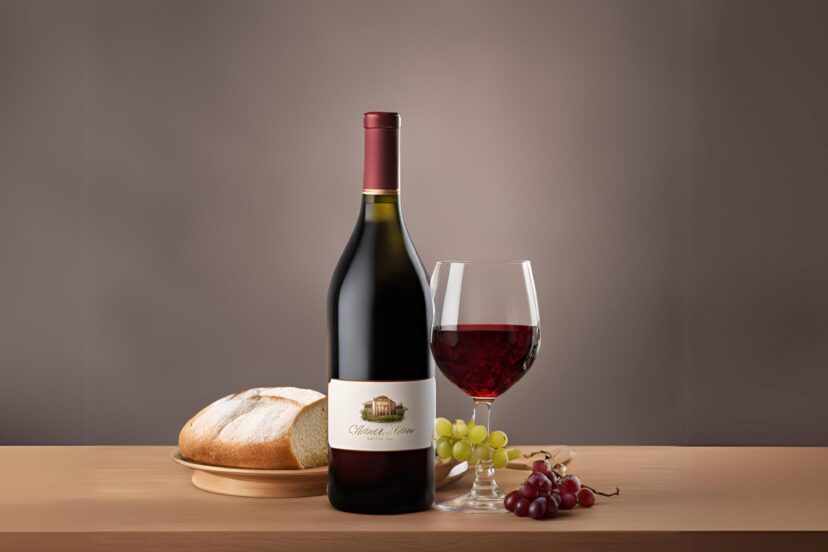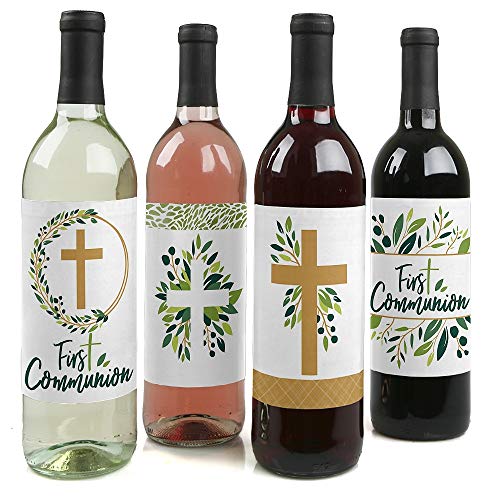Communion Wine: Ensuring Quality And Purity For Worship
Post Disclaimer
*We may earn a commission for purchases made using our links. Please see our disclosure to learn more.
Communion wine plays a crucial role in religious ceremonies, yet many churches struggle to find the right balance between quality, purity, and affordability. You might wonder how to select a wine that meets both liturgical requirements and your congregation’s expectations.
Did you know that communion wine must be natural and unspoiled according to church laws? This article will guide you through the process of choosing and maintaining high-quality communion wine for your worship services.
Learn how to ensure your sacramental wine upholds the sacred nature of your rituals.
Key Takeaways
- Communion wine must be natural and unspoiled according to church laws, with many religious communities sourcing from specialized producers to ensure quality and adherence to requirements.
- Both red and white wines are used for communion, with red symbolizing Christ’s blood and white representing purity and forgiveness.
- Proper storage of communion wine involves keeping it at 55-65°F, away from light, and at 50-80% humidity to maintain its quality and prevent spoilage.
- Different religions have varying practices: Roman Catholics use only grape wine, Methodists offer both wine and grape juice, and Mormons use water instead of wine.
- Fairtrade altar wine has become popular among churches due to ethical sourcing practices while still meeting quality standards for religious ceremonies.
History of Communion Wine
The use of wine in religious ceremonies dates back thousands of years, with ancient cultures incorporating it into their rituals. Christian traditions adopted wine as a central element in communion, representing the blood of Christ and symbolizing spiritual transformation.
Traditional use in religious ceremonies
Communion wine has been an integral part of religious ceremonies for centuries, particularly in Christian traditions. You’ll find its roots deeply embedded in the Last Supper, where Jesus shared wine with his disciples.
This sacred act became the foundation for the Eucharist, a central ritual in many Christian denominations.
Churches across various faiths have specific requirements for communion wine to ensure its quality and purity. Red wine often symbolizes the blood of Christ, while white wine represents purity and forgiveness.
Some congregations opt for non-alcoholic alternatives like grape juice, adhering to their interpretations of scripture and community needs.
The quality and integrity of the chosen communion wine are of utmost importance.
Liturgical laws dictate that communion wine must be natural and unspoiled, emphasizing the significance of using pure, unadulterated wine in worship. Many religious communities source their sacramental wine from reputable producers who specialize in crafting wines specifically for sacred ceremonies, ensuring both quality and adherence to church requirements.
Evolution of ingredients and methods
The evolution of communion wine ingredients and methods has seen significant changes over the centuries. Early Christian communities used local wines, often mixed with water, as part of their religious ceremonies.
As the Church expanded, standardization became necessary to maintain consistency across different regions.
In medieval times, the Catholic Church established specific guidelines for communion wine production. These rules emphasized the use of pure grape wine without additives. The fermentation process had to be natural, and the wine needed to maintain its integrity throughout storage and use.
This focus on quality and purity remains a cornerstone of communion wine production today.
Modern communion wine production combines traditional methods with contemporary winemaking techniques. Many churches now offer both alcoholic and non-alcoholic options to accommodate diverse preferences and needs.
The introduction of Fairtrade altar wine has added an ethical dimension to sourcing practices. Quality control measures have become more stringent, ensuring that the wine meets both religious and safety standards.
The next section will delve into the importance of quality and purity in communion wine.
Importance of Quality and Purity in Communion Wine
Quality and purity in communion wine hold paramount importance due to its symbolic representation of Christ’s blood. Ensuring unadulterated wine maintains the integrity of religious ceremonies and respects the sacred nature of this sacramental element.
Symbolic representation of the blood of Christ
Communion wine holds profound significance in Christian worship as a symbolic representation of Christ’s blood. This sacred beverage embodies the ultimate sacrifice Jesus made for humanity’s salvation.
The deep red hue of the wine visually reinforces its connection to blood, while its transformative nature—from grape to fermented liquid—mirrors the spiritual transformation believers seek through communion.
You’ll find that churches carefully select their communion wine to uphold the ritual’s sanctity. Many congregations opt for red wine to maintain the visual symbolism, though white varieties are sometimes used to represent purity and forgiveness.
The wine’s quality and integrity are paramount, as it serves as a tangible link between worshippers and their faith. Churches adhere to strict guidelines, ensuring the wine is natural and unspoiled, in accordance with liturgical laws.
Significance of using pure and unadulterated wine
Building on the symbolic representation of Christ’s blood, the significance of using pure and unadulterated wine in communion is paramount. Liturgical laws mandate that communion wine must be natural and unspoiled, emphasizing the importance of quality and integrity in this sacred element.
This requirement stems from the understanding that the wine represents the ultimate sacrifice, and any adulteration could compromise its symbolic value.
Using pure wine ensures that the sacrament remains true to its intended purpose. Churches often source their communion wine from reputable producers who specialize in creating wines specifically for religious ceremonies.
These producers adhere to strict guidelines, avoiding the use of unnecessary additives or preservatives that might alter the wine’s composition. The purity of the wine also reflects the purity of faith and devotion in the religious community.
The quality of communion wine is a reflection of our reverence for the sacrament itself.
Fairtrade altar wine has become increasingly popular among churches due to its ethical sourcing practices and high-quality standards. This choice not only ensures the purity of the wine but also supports sustainable and fair production methods.
Whether red or white, the wine used in communion serves as a powerful symbol of Christ’s sacrifice and the covenant between God and His people.
The Composition of Communion Wine
Communion wine typically consists of fermented grape juice, carefully selected for its quality and purity. Producers often use specific grape varieties and follow strict fermentation processes to create wine suitable for religious ceremonies.
Types of grapes used
Various grape varieties contribute to the production of communion wine, each offering unique characteristics suitable for sacred ceremonies. Red grapes like Cabernet Sauvignon, Merlot, and Pinot Noir are popular choices, providing rich colors and flavors that symbolize the blood of Christ.
The Big Dot of Happiness First Communion Elegant Cross Wine Bottle Label Stickers set includes four high-quality, waterproof stickers designed to enhance the presentation of wine or liquor bottles for religious celebrations. These 4-inch by 5-inch labels are perfect for standard 750 ml bottles and can be easily applied without removing the original labels. They add a personal, elegant touch to any First Communion event, making them an ideal gift or decorative addition to a beverage bar. Proudly made in the USA.
- High Quality and Waterproof: The labels are professionally printed on glossy sticker paper, ensuring durability and resistance to water.
- Easy to Use: The labels can be applied directly over existing bottle labels, simplifying the preparation process.
- Elegant and Coordinated Design: These labels add a sophisticated touch to religious celebrations, enhancing the overall presentation.
- Limited to Standard Bottle Sizes: The labels are designed specifically for standard 750 ml bottles, limiting their use on other bottle sizes.
- No Wine Included: The set includes only the labels, requiring an additional purchase of wine or liquor bottles.
- Alcoholic Theme: As the labels are intended for wine or liquor bottles, they may not be suitable for all audiences or events.
White grapes such as Chardonnay and Sauvignon Blanc are also used, especially in churches that prefer white wine to represent purity and forgiveness.
You’ll see that some wineries focus on crafting communion wines using specific grape blends to meet church requirements. These blends often prioritize natural fermentation processes and avoid additives, ensuring the wine remains pure and unadulterated.
The selection of grapes plays a crucial role in maintaining the quality and integrity of communion wine, adhering to liturgical laws that mandate the use of natural, unspoiled wine for religious rites.
Fermentation process
The fermentation process for communion wine follows strict guidelines to ensure quality and purity. You’ll find that producers typically use natural yeasts to convert the grape sugars into alcohol, avoiding artificial additives or preservatives.
FRE Red Wine Blend is a 750mL bottle of alcohol-removed wine, perfect for adults seeking a sophisticated beverage without the alcohol content. This specialty non-alcoholic wine offers a delightful blend of grape and cherry fruit flavors, enhanced by subtle notes of smoke and spice. Crafted from premium California vineyards, this wine features bold black cherry aromas and a long, smooth finish, making it an ideal pairing for grilled salmon, mushroom risotto, tomato-based pastas, or glazed ham. Utilizing state-of-the-art spinning cone technology, the alcohol is meticulously removed.
- Flavorful Experience: Retains rich grape and cherry flavors with subtle smoke and spice, providing a satisfying taste for non-alcoholic wine enthusiasts.
- Health-Conscious Option: Ideal for adults who prefer or need to avoid alcohol, without compromising on the wine-drinking experience.
- Versatile Pairing: Complements a variety of dishes, from grilled salmon to tomato-based pastas, enhancing dining occasions.
- Flavorful Experience: Retains rich grape and cherry flavors with subtle smoke and spice, providing a satisfying taste for non-alcoholic wine enthusiasts.
- Health-Conscious Option: Ideal for adults who prefer or need to avoid alcohol, without compromising on the wine-drinking experience.
- Versatile Pairing: Complements a variety of dishes, from grilled salmon to tomato-based pastas, enhancing dining occasions.
This method aligns with liturgical laws requiring communion wine to be natural and unadulterated. The process can take several weeks to months, depending on the desired alcohol content and flavor profile.
Careful monitoring of temperature and sugar levels during fermentation is crucial for maintaining the wine’s integrity. Red wines may undergo extended maceration to extract color and tannins, while white wines are often fermented at cooler temperatures to preserve delicate aromas.
The next step in crafting communion wine involves proper storage and handling to maintain its sacred qualities.
Additives and preservatives
Communion wine typically contains minimal additives and preservatives to maintain its purity and symbolism. You’ll find that most sacramental wines are made from natural grape juice without artificial ingredients.
This adherence to tradition ensures the wine remains a valid matter for church sacraments and religious rites.
Preservatives in communion wine are strictly limited to those necessary for stability during storage and transport. Sulfites, naturally occurring compounds in grapes, may be present in small amounts to prevent oxidation and microbial growth.
Some producers use argon gas to protect the wine from oxygen exposure, preserving its quality without altering its composition. These careful practices uphold the integrity and authenticity of the sacred wine used in Eucharistic ceremonies.
Ensuring Quality and Purity in Communion Wine
Quality and purity in communion wine are paramount for religious ceremonies. Producers follow strict guidelines to ensure the wine meets church requirements and maintains its sacred significance.
Industry standards and regulations
Industry standards and regulations play a crucial role in maintaining the quality and purity of this. These guidelines ensure that the sacred nature of the ritual is upheld and that the wine used meets specific requirements for religious ceremonies.
- Natural and Unadulterated: Liturgical laws mandate that communion wine must be natural and free from spoilage. This requirement ensures that the wine symbolically represents the blood of Christ without any artificial additives or preservatives.
- Grape Variety Specifications: Many religious communities have specific guidelines on the types of grapes that can be used for communion wine. These specifications often dictate whether red or white grapes are acceptable, and may even specify particular grape varieties.
- Alcohol Content Regulations: Some denominations have strict rules regarding the alcohol content of communion wine. While some require a minimum alcohol percentage to prevent spoilage, others may opt for non-alcoholic alternatives like grape juice.
- Fairtrade Certification: An increasing number of churches are opting for Fairtrade altar wine. This certification ensures that the wine is ethically sourced and produced, aligning with the values of social justice and fair labor practices.
- Storage and Handling Standards: Proper storage and handling of communion wine are essential to maintain its quality. Guidelines often include recommendations for temperature control, light exposure, and storage container materials.
- Purity Testing: Some religious organizations require regular testing of communion wine to verify its purity and composition. These tests may check for adulterants, proper fermentation, and adherence to prescribed standards.
- Approved Producers List: Many churches maintain a list of approved wine producers who meet their specific requirements for communion wine. This ensures consistency and quality across different parishes or congregations.
- Labeling Requirements: Regulations often dictate specific labeling for communion wine, including information about its origin, composition, and intended use for sacramental purposes.
- Non-Alcoholic Alternatives: Some denominations have established guidelines for the use of non-alcoholic alternatives, such as grape juice, to accommodate those who abstain from alcohol while still maintaining the symbolic significance of the ritual.
Importance of sourcing from reputable producers
Sourcing communion wine from reputable producers is crucial for maintaining the sacred nature of religious ceremonies. You’ll want to find established wineries with a track record of producing high-quality sacramental wines.
These producers understand the specific requirements, ensuring it meets liturgical laws and church standards. They often use carefully selected grapes and follow strict fermentation processes to create wines that are natural and unadulterated, as required for valid matter in church sacraments.
Reputable producers also prioritize the ethical sourcing of ingredients, with many offering Fairtrade altar wines. This commitment to quality and integrity extends to proper storage and handling practices, which are essential for preserving the wine’s purity.
By choosing a trusted source, you’re not only ensuring the authenticity of the communion wine but also supporting producers who respect the significance of this holy sacrament in religious communities.
Proper storage and handling
After sourcing communion wine from reputable producers, proper storage and handling are crucial to maintain its quality and purity. You’ll need to follow specific guidelines to ensure the wine remains suitable for sacred ceremonies. Here’s what you need to know about storing and handling:
- Temperature control: Keep the wine at a consistent temperature between 55°F and 65°F (13°C to 18°C) to prevent spoilage and maintain flavor integrity.
- Light protection: Store bottles in a dark place or use UV-resistant containers to shield the wine from harmful light exposure that can degrade its quality.
- Humidity management: Maintain a relative humidity of 50-80% to prevent cork drying and potential contamination.
- Bottle positioning: Store wine bottles horizontally to keep the cork moist and prevent air from entering, which can lead to oxidation.
- Vibration reduction: Minimize movement and vibration around stored wine to avoid disturbing sediment and altering the wine’s composition.
- Cleanliness: Use sterilized equipment and containers when handling communion wine to prevent contamination and ensure purity.
- Proper serving: Pour the wine carefully to avoid introducing sediment into the chalice or communion cups.
- Limited oxygen exposure: Once opened, consume the wine promptly or use wine preservation systems to minimize oxidation and maintain quality.
- Regular inspection: Check stored wine periodically for signs of spoilage, such as off-odors or changes in color, to ensure it remains suitable for use in religious ceremonies.
- Rotation: Implement a first-in, first-out system to use older stock before newer arrivals, maintaining freshness and quality across your inventory.
The Role of Communion Wine in Different Religions and Denominations
It plays a crucial role in various religious traditions, with each denomination having specific requirements for its use in sacred ceremonies. Read on to discover how different faiths incorporate this symbolic element into their worship practices.
Roman Catholicism
Roman Catholic churches adhere to strict guidelines. You’ll find that their liturgical laws require the use of natural, unadulterated wine made from grapes. This practice stems from the belief that the wine transforms into the blood of Christ during the Eucharist.
The Catholic Church permits both red and white wines for communion, though red is more commonly used due to its symbolic connection to blood. Quality and purity are paramount, with many parishes sourcing their sacramental wine from reputable producers who specialize in altar wines.
These wines often undergo rigorous testing to ensure they meet the Church’s standards for use in sacred ceremonies.
Methodism takes a different approach to communion wine, which we’ll explore next.
Methodism
Methodists approach communion wine with a unique perspective. You’ll find that many Methodist churches offer both wine and grape juice during their communion services. This practice stems from their commitment to inclusivity and their historical ties to the temperance movement.
Methodist congregations prioritize the symbolism of Christ’s sacrifice over the specific type of liquid used in the sacrament.
Quality and purity remain essential considerations for Methodist churches when selecting. They often choose wines that are natural and unadulterated, adhering to liturgical laws that emphasize the integrity of the elements used in worship.
For those opting for wine, Methodist churches typically select varieties that are low in alcohol content to maintain the focus on the spiritual significance of the ritual. The next section explores communion wine practices in other religious denominations.
Other religious practices
Beyond Methodism, various religious traditions incorporate wine or similar beverages into their sacred rituals. Eastern Orthodox churches, for instance, use red wine mixed with warm water in their Eucharistic celebrations.
This practice symbolizes the blood and water that flowed from Christ’s side during the crucifixion.
In Judaism, wine plays a central role in many ceremonies. The Kiddush, a blessing recited over wine to sanctify the Sabbath and Jewish holidays, requires kosher wine. Some Reform and Conservative synagogues offer grape juice as an alternative for those who abstain from alcohol.
Mormon communities, on the other hand, use water instead of wine for their sacrament meetings. This change occurred in the late 19th century due to concerns about alcohol consumption.
Regardless of the specific beverage used, religious communities across faiths prioritize the quality and purity of their sacramental drinks, recognizing their significance in worship and spiritual connection.
Conclusion
It remains a sacred element in worship, demanding the highest standards of quality and purity. Your choice of sacramental wine reflects your commitment to upholding the sanctity of religious ceremonies.
By sourcing from reputable producers and following proper storage guidelines, you ensure the integrity of this holy symbol. The wine you select for communion plays a vital role in connecting worshippers to their faith and honoring religious traditions.
FAQs
1. What makes communion wine pure?
Pure communion wine contains only fermented grape juice. It lacks additives or preservatives. Quality vineyards grow grapes specifically for this purpose. Strict processing methods ensure purity.
2. How do churches maintain wine quality?
Churches store communion wine in cool, dark places. They use special containers to prevent contamination. Regular quality checks help maintain freshness. Proper handling during services is crucial.
3. Can communion wine go bad?
Yes, communion wine can spoil. Exposure to air or heat speeds up this process. Churches should use opened bottles within a few days. Proper storage extends shelf life significantly.
4. Is there a difference between regular and communion wine?
Communion wine is often sweeter than table wine. It has a higher alcohol content to prevent spoilage. Some churches use non-alcoholic alternatives. The focus is on symbolic meaning rather than taste.










